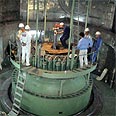
Iran: We will build 20 new nuclear plants
Head of Tehran's National Security and Foreign Policy Commission says Iran will built another 20 power plants, two as soon as March 2006; Britain, U.S. and France pressure Russia and China to endorse efforts to refer Iran to U.N. Security Council; test launching of Arrow missile in Israel and Iran's deal to purchase weapons from Russia mark escalation in arms race between two states, experts claim
Iran's Atomic Energy Organization has been given license to set up another 20 nuclear plants, two of them by March 2006, head of Tehran's National Security and Foreign Policy Commission Alaeddin Boroujerdi was quoted saying Sunday, in Tehran's official news agency IRNA.
Iran's first nuclear plant is being built by
Russia for USD 1 billion and is scheduled to begin operating by March 2006.
According to Boroujerdi, the new power plants will be able to generate 20,000 megawatts of electricity. However, international and Israeli intelligence sources claim the program may be a front to build an atomic bomb, an allegation Iran's vigorously denies.
In addition, the New York Times reported Sunday that the U.S. and Britain are trying to persuade China and Russia that there is enough evidence pointing to Iran's plan to develop nuclear capabilities.
According to one diplomat, who requested to remain anonymous, the new effort proposed by Britain and endorsed by the U.S. and France seeks to convince the five major nuclear weapons powers that are also permanent members of the U.N. Security Council.
"If we could get China and Russia to agree that this bears all the hallmarks of a weapons program, it could have an enormous impact on Iran," one European senior diplomat said.
While China and Russia have both declared that Iran should not be allowed to have nuclear capabilities, they have objected to U.S. efforts to get the nuclear agency to refer Iran to the Security Council.
' Effort to become nuclear power state'
MK Yuval Steinitz (Likud), chairman of the Knesset's Foreign Affairs and Defense Committee, said in response that "the Iranian plan to build 20 more nuclear plants is an indication to Iran's national effort to become a global nuclear power state."
"Although the plants are designated to produce electricity, they might definitely serve the Iranian military effort by transferring materials from the plant's nuclear fuel to the military industry," he added.
According to Steinitz, "the Iranians' full plan is not only to equip themselves with a bomb, but rather with dozens of bombs over the years."
"The committee has used this information in the past year in its meeting with foreign affairs and defense committees of all the world's major states in order to explain and clarify the gravity of Iranian global threat if it is not halted before it is too late," he said.
"The question what Israel should do against Iran on the military level should be blurred as much as possible," he added.
Former Shin Bet Chief Ami Ayalon said Sunday that "the strategic environment in the region will change fundamentally should Iran gain the capability to produce nuclear weapons."
"Israel must not accept such a possibility and Israel must not allow Iran to reach the point of no return in the process of producing nuclear weapons," he added.
Arms' race?
Meanwhie, Israeli security experts estimate that Israel and Iran have engaged in an unprecedented arms race on a defensive level, Israel's leading newspaper Yedioth Ahronoth reported Sunday.
Experts, who have followed military development schemes in both countries, claim that Israel's recent test launch of the Arrow missile, and Iran's deal to purchase anti-ballistic missiles from Russia signed on the same day, are indications that the states are in an armament face off.
The IDF carried out a successful test of the Arrow anti-missile system Thursday at a secret location in the center of the country.
The Arrow batteries intercepted a ballistic test missile and destroyed it in what experts described as the most complicated interception test carried out by the military so far.
Regional menace
Defense Minister Shaul Mofaz lauded the Israel Military Industries following the test, and said that the Arrow succeeded in intercepting ballistic missiles similar to Iran's Shihab 3.
Head of the arrow project Boaz Levi stated
that the interception of a missile simulating regional threats was "an extreme scenario to the missiles' capacities," hinting that the test was related to the growing Iranian menace.
Sources at the defense establishment said that ongoing development of the arrow missile, together with the purchase of two other Dolphin-type submarines from Germany, will enhance the Israeli navy's deterrence capabilities.
The submarines will be put to use in the event of a second strike, as a retaliatory force against Iran, foreign sources have explained.
A new cold war?
Meanwhile, it was reported Friday that Iran is to acquire USD 1 billion worth of advanced missiles and other systems from Russia.
According to experts, the Tor-M1 system the Iranians have purchased could identify up to 48 targets and fire at two targets simultaneously at a height of up to 20,000 feet.
The purchase of the missile system reveals Iran's fear of an Israeli strike, Israeli sources claim. A strike of this nature could be carried out by the IAF or the navy.
Meanwhile, the Iranians have continued their nuclear arms race as well. The country approved a bill Saturday blocking international inspections of atomic facilities if the nation is referred to the U.N. Security Council for inspections.
An Israeli security expert said Saturday that Iran's efforts to obtain an atomic bomb and long-range launching capabilities constitute a threat not only to Israel but to Europe as well, and that the situation may develop into a new type of cold war.
Arieh Egozy contributed to the report










